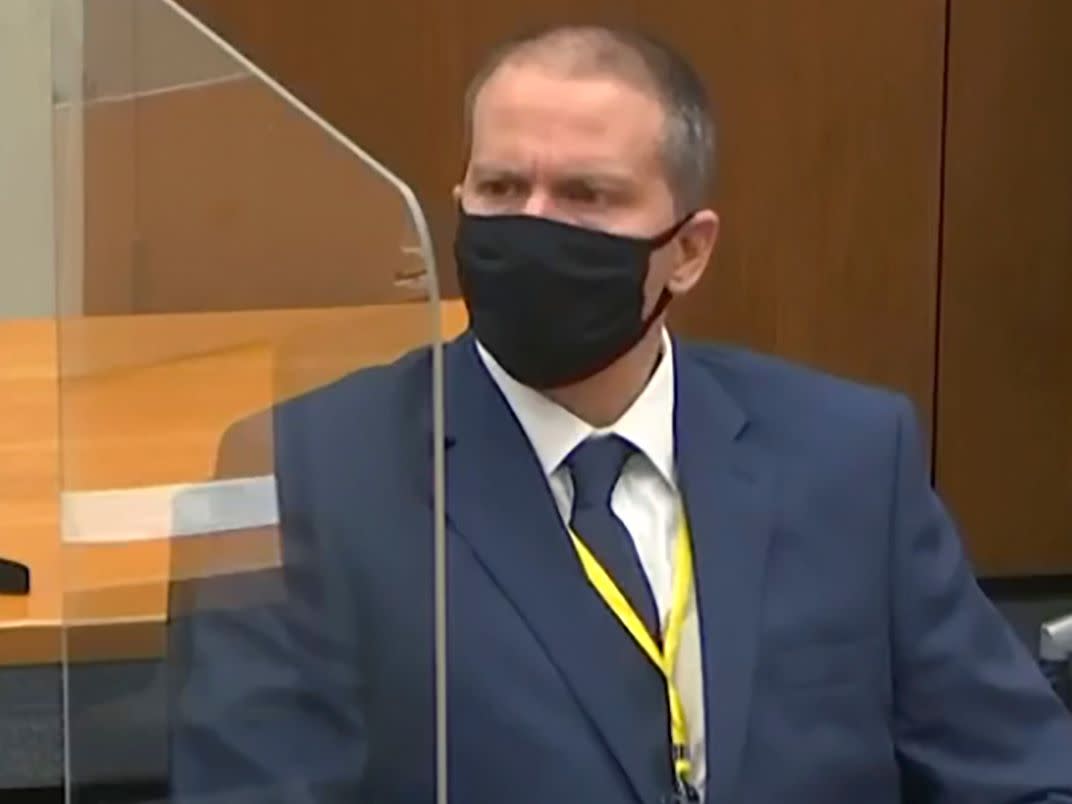Jury selection paused in Derek Chauvin’s murder trial as George Floyd’s sister calls proceeding ‘very emotional’
Jury selection was put on hold Monday in the murder trial against Derek Chauvin, the fired Minneapolis police officer who knelt on George Floyd’s neck until the Black man’s heart stopped beating.
The judge hearing the case initially said during a livestream Monday that he planned to move ahead with picking the 14-person jury while an ongoing battle over reinstatement of a third-degree murder charge unfolded in the background.
But he later reversed course and sent the prospective jurors home for the night, saying prosecutors had a right to ask the Minnesota Court of Appeals for an emergency pause of the proceedings.
He said he hoped to get a decision on a possible stay by Tuesday.
“I did indicate that it was my intent that we go forward with (housekeeping motions) and jury selection unless someone tells me not to,” Hennepin County District Court Judge Peter Cahill said Monday morning.
But he conceded prosecutors still had the right to seek a telephonic appeals court ruling “essentially to stop us from going forward” pending a final decision on charges.
“We have jurors, but I think realistically we’re not going to get to any jury selection and we won’t have an answer until at least tomorrow. So unless any of the parties object, I’m going to kick our jurors loose and start everything tomorrow with jury selection,” he said.

Chauvin, 44, has pleaded not guilty to second-degree unintentional murder and second-degree manslaughter charges.
He is the first of the four officers charged in the case to face trial. He remains out on bail and appeared in the courtroom Monday wearing a navy blue suit and tie as well as a black mask due to COVID protocols.
Judge Cahill previously dismissed a third-degree murder charge against Chauvin in October, concluding such a charge only applies when a defendant’s actions are “not specifically directed at the particular person whose death occurred.”
Then a precedent-setting Feb. 1 ruling by the Minnesota Court of Appeals decided third-degree murder could apply when deadly force is directed at only a single person and not eminently dangerous to others.
The Feb. 1 ruling upheld the third-degree murder conviction of Minneapolis police officer Mohamed Noor in the 2017 fatal shooting of 40-year-old Justine Ruszczyk Damond.
Judge Cahill said in a Feb. 11 ruling that he disagreed with the Noor decision and wouldn’t consider it a precedent until Noor’s options to appeal were exhausted.
On Friday, the appeals court issued an 18-page ruling ordering Cahill to reconsider, saying he “erred” when he found he was “not bound by the principles of law set forth in Noor.”
Chauvin’s defense lawyer, Eric Nelson, said Monday he planned to petition the Minnesota Supreme Court to review the appeals court decision ordering Cahill to reconsider, a move that set the stage for prosecutors to seek the delay in jury selection.
“This court will be seating jurors for a trial about which we don’t know what the exact charges are going to be yet,” Assistant Attorney General Matthew Frank argued Monday.
“We’re not trying to delay this case. We want to try this case, but we want to try it right. And we only have the ability to try it once,” he said.
Chauvin is facing up to 40 years in prison if convicted of the top charge in the high-profile trial playing out amid one family’s fight for justice and a national reckoning with systemic racism and police brutality.
The lesser charge of third-degree murder carries a maximum of 25 years in prison but would give prosecutors another possible route to win a conviction.
George Floyd, a father of five, died May 25 after he was taken into custody by a group of now-fired Minneapolis police officers and restrained face-down on the pavement for approximately nine minutes as he gasped for breath.
When 17-year-old bystander Darnella Frazier started recording the deadly arrest, Chauvin was kneeling on Floyd’s neck in steely silence even though the unarmed Black man was already handcuffed, clearly in distress and not suspected of a violent crime.
“Please. Please. Please, I can’t breathe,” Floyd cried.
“Mama! Mama!” he called out for his recently deceased mother.
According to police bodycam video cited by prosecutors, Chauvin continued to kneel on Floyd’s neck for 1 minute and 53 seconds after Floyd appeared to stop breathing altogether.
Floyd was unresponsive and in cardiac arrest when Chauvin finally relented and removed his knee so a stretcher could taken him from the scene, prosecutors have said.
Floyd’s youngest sibling, Bridgett Floyd, was at the courthouse in Minneapolis on Monday, appearing as the first relative to fill the single seat allotted to a Floyd family member for the pandemic-era proceeding.
“Today has been very, very emotional. I have been on a roller-coaster ride,” she said outside the courthouse after the judge ended the day’s hearing.
“I sat in the courtroom today and looked at the officer who took my brother’s life,” she said.
“I just really wanted that officer to know how love much Floyd had, not only by me and his family but you guys too and the people around the country,” the sister said.
“I miss my brother,” she said. “The officer took a great man, a great father, a great brother, a great uncle.”
